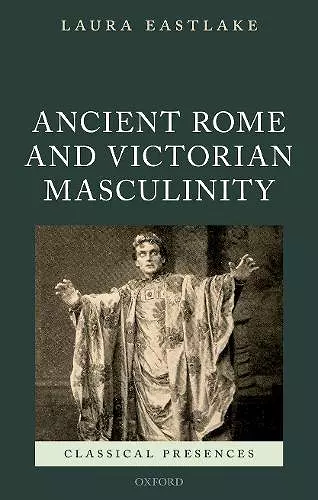Ancient Rome and Victorian Masculinity
Format:Hardback
Publisher:Oxford University Press
Published:4th Dec '18
Currently unavailable, and unfortunately no date known when it will be back

Ancient Rome and Victorian Masculinity examines Victorian receptions of ancient Rome, with a specific focus on how those receptions were deployed to create useable models of masculinity. Romans in Victorian literature are at once pagan persecutors, pious statesmen, pleasure-seeking decadents, and heroes of empire, and these manifold and often contradictory representations are used as vehicles equally to capture the martial virtue of Wellington and to condemn the deviance and degeneracy of Oscar Wilde. In the works of Thomas Macaulay, Wilkie Collins, Anthony Trollope, H. Rider Haggard, and Rudyard Kipling, among others, Rome emerges as a contested space with an array of possible scripts and signifiers which can be used to frame masculine ideals, or to vilify perceived deviance from those ideals, though with a value and significance often very different to ancient Greek models. Sitting at the intersection of reception studies, gender studies, and interdisciplinary literary and cultural studies across discourses ranging from education and politics, this volume offers the first comprehensive examination of the importance of ancient Rome as a cultural touchstone for nineteenth-century manliness and Victorian codifications of masculinity.
... E.[Eastlake] wonderfully shows how imperial masculinity couched in the language of Classical Rome was continually contested and up for grabs in Victorian Britain * Daniel Orrells, Kings College London, Journal of Roman Studies *
The book's approach, through the lens of gender studies, politics, and imperialism, is also innovative and gives the book a very clear direction and purpose as well as a wide appeal beyond literary studies in a narrow sense ... the book is extremely rigorous, showing a wide breadth and depth of scholarship and an effective methodology. The author has combed the archives, including letters, magazine and newspaper articles, and a great range of secondary criticism. The theoretical basis of her approach to masculinity is securely grounded in recent studies while moving forward to explore Victorian alternatives to the limited and conventional models of masculinity that were available at the time. * Praise by the University English Book Prize Committee 2020 *
As Laura Eastlake's Ancient Rome and Victorian Masculinity convincingly argues, in the Victorian age conservative and radical politicians, men of letters, imperial conquerors and rulers, and even aesthetes and Wildean decadents saw themselves as latter-day Romans... This detailed account of the reception of ancient Rome joins with other current scholarship in deconstructing the idea of a single unified Victorian masculinity. At a given historical moment, the changing confluence of class position, education, and the real world of foreign threats and of empire creates different styles of manliness. The study, then, productively expands our sense of the importance of Roman models within the Victorian male psyche... Eastlake reminds us that the British envisioned their empire as a new Rome. * Herbert Sussman, The New School, Victorian Studies *
Laura Eastlake's elegant monograph weaves together many disparate threads in a clear and persuasive way. It is a pleasure to see visual, ephemeral, political, and literary evidence discussed with equal care. The book has much to offer Classicists and Victorianists in both its level of specificity and its methodology. * Christian Lehmann, Bryn Mawr Classical Review *
There is a high level of originality in this project...the book is extremely rigorous, showing a wide breadth and depth of scholarship and an effective methodology. The author has combed the archives, including letters, magazine and newspaper articles, and a great range of secondary criticism...The case studies, such as that of the reception of the Emperor Nero who was perceived as either monstrous or as an ideal of artistic masculinity, are both fascinating and well-argued. * University English Book Prize - Honourable Mention *
Laura Eastlake's elegant monograph weaves together many disparate threads in a clear and persuasive way. It is a pleasure to see visual, ephemeral, political, and literary evidence discussed with equal care. The book has much to offer Classicists and Victorianists in both its level of specificity and its methodology. * Christian Lehmann, Bard High School Early College-Cleveland , Bryn Mawr Classical Review *
As an academic project,Ancient Rome and Victorian Masculinityis a massive accomplishment. Eastlake's reach as a scholar of nineteenth-century literature and culture is extensive... * Michael Kramp, Lehigh University, Nineteenth-Century Gender Studies *
Eastlake's interpretation of Marius the Epicurean, both as a novel and as an intervention into Victorian debates on masculinity, is exemplary; she makes this structurally difficult historical novel relevant to its time and accessible to our own. . . . This is a well-researched, well written, and historically sensitive book. It refuses to fix a single meaning of the Roman world for the Victorians, instead cultivating multiple understandings of both Roman antiquity and Victorian masculinity, as well as their many intersections * James Campbell, University of Central Florida, English LIterature in Transition *
it is hard not to enjoy Eastlake's wide reading, her careful choice of sources, her detailed interpretations, her well-chosen illustrations. From the early decades of the nineteenth century, when the Roman ideal seemed to have been monopolised by Napoleon, while Greek imagination and flexibility could be better appropriated in Britain, to the militarising ideologies of turn-of-the-century imperialists, we are taken through a vast range of different and often contradictory interpretations, literary, political and cultural. Distinctly enlightening. * Keith Maclennan, Classics for All *
- Winner of Awarded an Honourable Mention by the University English Book Prize 2020.
ISBN: 9780198833031
Dimensions: 223mm x 149mm x 23mm
Weight: 460g
258 pages